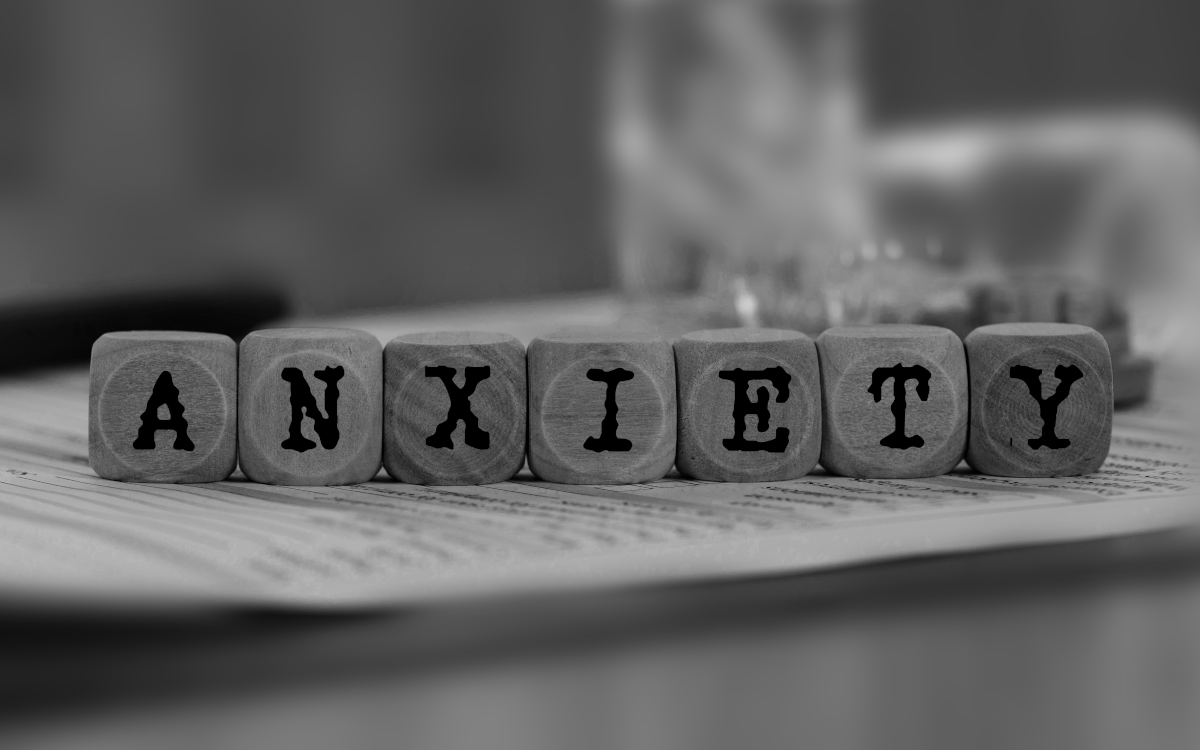Supercharge your day |
As men, we’re often expected to bottle up our emotions and hide what we’re feeling. We’re told to ‘just man up’ when things get on top of us.
But this shouldn’t be the case at all. It’s not healthy, it’s not helpful—and it’s not going to get you anywhere.
The stigma surrounding mental health, particularly in men, is something that is thankfully changing for the better. But there are still plenty of guys out there who think they’ll be seen as weak or vulnerable if they dare to show that they’re struggling mentally.
Well, we’re going to unapologetically say that this idea of talking about mental health being a sign of weakness is absolute bull.
Man or woman, old or young, everybody has a right to be heard and to be helped.
And one of the biggest issues that goes quietly unmentioned is anxiety.
Too many people (men especially) go through life feeling anxious. But they either don’t know how to recognise, handle, or admit they are suffering, or they’re simply afraid to reach out for help or deal with it head-on.
So, let’s do that now. Let’s take a look at what anxiety is, the reasons you could be going through it, and some ways to help you manage and combat the mental and physical symptoms and underlying reasons behind anxiety.
What is anxiety?
Anxiety is a word that has had all the sting taken out of it through overuse and misuse.
Its seriousness has been diminished by too many people claiming to have anxiety over things that they simply just don’t like. Which is ironic, considering that genuine anxiety often slips under the radar or is ignored.
In reality, anxiety is a common condition that affects millions of people worldwide. In the United States alone, around 40 million adults are affected by anxiety disorders—making it the most common mental health issue in the country. That’s almost 20% of the adult population.
An anxiety disorder is typically characterised by feelings of worry, abnormal fear responses, and unease—which can be genuinely debilitating and impact various aspects of life.
There’s not just one form of anxiety either. No, there are multiple different diagnoses related to anxiety disorders, including…
- Generalised Anxiety Disorder (GAD)
- Panic Disorder (PD)
- Social anxiety disorder (also known as social phobia)
- Other phobias (e.g. agoraphobia)
- Post-traumatic stress disorder (PTSD)
- Obsessive-compulsive disorder (OCD)
- Body-dysmorphic disorder (BDD)
- Health anxiety
As you can see, an anxiety disorder covers a broad spectrum and is more than simply feeling “a bit sad or nervous”.
And what many people don't realise is that anxiety can also have an impact on testosterone levels in the body—which then has even more of a knock-on effect to your health, fitness, libido, and overall wellbeing.
What is the link between anxiety and testosterone?

Testosterone is a key sex hormone that’s responsible for regulating your mood, energy levels, and sexual function, among other things. And when your anxiety levels rise, it can disrupt the already delicate balance of sex hormones in the body, including testosterone.
Studies have shown that chronic or severe anxiety can lead to decreased testosterone levels, as anxiety triggers the release of stress hormones like cortisol, which can inhibit the production of testosterone. So when this continues over a long period of time, the effects can become more and more pronounced.
One reason for this is that the release of cortisol leads to a negative feedback loop that stops the hypothalamic-pituitary-gonadal axis (HPG axis) from releasing sex hormones.
But not only that, it’s believed that cortisol further reduces the production of testosterone by directly affecting the Leydig cells in the testes, too.
And to add even more insult to injury, anxiety can also lead to poor sleep quality and reduced physical activity, both of which can further contribute to lowered testosterone levels.
Not to mention other testosterone-reducing activities, like smoking, drinking alcohol, and comfort eating junk foods—which are all classic coping mechanisms for stress and poor mental health.
Anxiety and testosterone have a complex relationship that goes beyond simple cause and effect, though. Because while anxiety can impact testosterone levels, low testosterone can also contribute to an increased risk of developing anxiety in men.
This creates a vicious cycle where anxiety and low testosterone feed off each other, worsening the overall condition.
Low testosterone levels can lead to symptoms like fatigue, irritability, and decreased libido— all of which can contribute towards feelings of anxiety and stress. Then the anxiety can disrupt sleep patterns and increase cortisol levels, which further suppress testosterone production.
But, the interconnected nature of anxiety and testosterone does offer some comfort. By managing your anxiety, you should be able to balance your testosterone levels somewhat, and vice versa—so you can ultimately enhance your mental and physical health whichever way you approach the issues at hand.
And that’s what we’ll dig into below, some tips and techniques for managing symptoms of anxiety while increasing your levels of testosterone.
But first, let’s take a look at some of the ways that anxiety can impact your mental and physical wellness.
How does anxiety affect physical and mental health?
It goes a little unmentioned, so we’ll say it here: Anxiety not only affects your emotional wellbeing—it also has a significant impact on your physical health.
Chronic anxiety can manifest in various physical symptoms, like headaches, muscle tension, and digestive issues.
And the issues go beyond those, as anxiety can also weaken your immune system, which makes you more susceptible to illnesses, as well as making it harder for you to recover from them quickly and efficiently.
From a mental health point of view, anxiety can really take a toll, leading to conditions like depression and exacerbating other existing mental health disorders.
On a general level, anxiety can also interfere with your ability to concentrate, make decisions, and perform well in daily activities.
Plus, the constant worry and fear that are associated with anxiety can become incredibly overwhelming and drain your energy, leaving you feeling exhausted and unmotivated.
Recognizing these detrimental effects of anxiety on both physical and mental health is the first step towards being able to manage it effectively.
You can then start to implement strategies to help reduce your anxiety and balance your testosterone levels to improve your overall wellbeing and regain control of your life.
So, let’s look at how to do that.
5 ways to manage anxiety disorders and balance hormone levels

Here are five key areas to focus on that can have positive impacts on the mental and physical symptoms of anxiety and imbalanced hormone levels.
Mindfulness and meditation
Mindfulness and meditation are powerful tools that can help you manage anxiety while promoting a sense of calm and relaxation.
The aim of mindfulness is to cultivate an awareness of the present moment and detach from anxious thoughts and worries.
Meditation, on the other hand, focuses more on training the mind to achieve a state of deep relaxation and inner peace. Regular meditation practice has been shown to reduce stress, anxiety—and even improve sleep quality.
Top tip: If you want to find out more about adding some mindfulness and meditation into your daily routine, check out our guide to busting stress and boosting testosterone through mindfulness.
Exercise and diet
Regular exercise is not just beneficial for your physical fitness—it can help you manage anxiety and balance testosterone levels too.
When you exercise, your brain releases endorphins. These are known as "feel-good" hormones, and for good reason. They can actually improve your mood and reduce your anxiety levels.
Exercising also leads to a better quality of sleep, which, as we’ve already seen above, is essential for maintaining optimal hormone levels.
Alongside physical activity, the other side of the health and fitness equation is eating healthily.
Following a balanced diet is just as important for reducing anxiety and promoting testosterone balance as exercise.
You don’t have to completely overhaul your diet either. No, it’s all about making little tweaks and additions to your daily menu.
For example, foods that are rich in omega-3 fatty acids, such as salmon and walnuts, have been shown to have mood-stabilising effects. So a couple of portions of salmon each week, or a handful of walnuts as a daily snack can pay dividends.
Likewise, try to consume more foods that are high in zinc, like oysters and lean meats, as these can further support healthy testosterone production.
Making exercise and a nutritious diet a priority are really proactive steps to take towards managing your anxiety and enhancing your testosterone levels. You can do it.
Therapeutic approaches

If you suffer from severe or persistent anxiety, seeking professional help through therapy can be incredibly valuable.
Forget any preconceived notions you might have about therapy, or what other people will think of you—there’s absolutely nothing to be ashamed of with reaching out for help.
Therapists are able to provide the guidance and support you might need to develop coping mechanisms and suggest further strategies for managing anxiety effectively.
One common therapeutic approach used to treat anxiety disorders is cognitive-behavioural therapy (CBT). This technique focuses on identifying and challenging negative thoughts and replacing them with more positive and realistic thought patterns.
Other psychological therapies, such as exposure therapy and mindfulness-based stress reduction (MBSR), can also be effective for managing your anxiety.
There’s no one right answer when it comes to therapy. Lots of different forms can lead to great results. It’s all about finding the most suitable therapeutic approach for your own specific needs and individual differences.
Getting in touch with your healthcare provider or a mental health professional is the first step here. They can then assess your symptoms, provide an accurate diagnosis, and develop an individualised treatment plan.
If your anxiety is a symptom of an underlying hormonal imbalance or medical condition, then your healthcare provider will be able to conduct tests to identify potential imbalances and recommend appropriate medication and treatment options.
And we’ll say it again because this really bears repeating: There is no shame in seeking help. In fact, asking for help when you need it is a surefire sign of strength.
Addressing anxiety and hormonal imbalances in a proactive manner can lead to a better quality of life and improved overall wellbeing. And, why wouldn’t you do whatever you can to achieve that?
Talking to others
If you’re unsure about reaching out for professional support or are unable to, seeking support from your friends, family members, and the wider community can also profoundly reduce symptoms of anxiety and improve your overall wellbeing.
Sharing your feelings and experiences with trusted people can provide emotional validation and promote a sense of understanding and empathy.
Simply having someone acknowledge and validate your emotions can go a long way in helping to reduce anxiety and bring a sense of comfort.
Friends, family, and support groups can all lend a listening ear and offer a safe space to express your thoughts and worries without judgement.
Talking to others about your anxiety can also offer a fresh perspective on your situation. Others may be able to provide insights, suggestions, or coping strategies based on their own experiences or knowledge that you might not have considered on your own.
Sometimes, gaining a different viewpoint is exactly what’s needed to dispel feelings of isolation and other anxiety symptoms.
When you feel anxious, even your regular daily responsibilities can often feel overwhelming. Seeking support from friends and family may be able to help alleviate some of these burdens too, by allowing them to provide practical assistance as well as emotional support.
This might include helping with errands, childcare, or other tasks that contribute towards feelings of stress and anxiety. Sharing the load will free up mental and physical energy so that you can focus on self-care and reducing your stress levels.
If you don’t feel comfortable talking to people you know or asking them for help, then you could join support groups or communities that are specifically focused on anxiety.
Having a support network of people who can understand and relate to your experiences can be invaluable.
Sharing your thoughts, fears, and coping strategies in this type of group setting can offer validation and inspiration while providing an extra sense of belonging and connectedness in social situations.
Natural supplements
In addition to healthy lifestyle changes and therapeutic approaches, natural supplements can also support anxiety management and testosterone balance.
Certain herbal remedies, such as chamomile and lavender, have calming properties that can help alleviate anxiety symptoms. Similarly, adaptogenic herbs and roots, like ashwagandha, fenugreek, and Panax ginseng, have all been shown to reduce stress and boost testosterone levels, too.
Vitamins and minerals, such as vitamin D, zinc, and magnesium, can also play a role in anxiety management and healthy testosterone levels.
These nutrients are involved in a whole load of bodily processes, including the regulation of mood and production of sex hormones.
You can obtain all of these ingredients through your diet. But a daily supplement is by far the easiest way to ensure you’re getting effective amounts.
How to manage anxiety disorders and boost testosterone levels

Managing your anxiety and balancing your testosterone levels are essential for optimal mental and physical wellbeing.
By understanding the relationship between anxiety and testosterone, implementing strategies to manage anxiety, and seeking professional help when needed, you can get back to feeling your best.
Remember: Relaxation techniques like mindfulness and meditation, getting enough sleep, regular exercise and a balanced diet, therapeutic approaches, and natural supplements can all play a role in anxiety management and testosterone balance.
If you're struggling with a panic disorder, social anxiety disorder, depressive symptoms, any other anxiety-related disorders, or you suspect hormonal imbalances, don't hesitate to seek professional help.
Your wellbeing is worth investing in, and you deserve the chance to manage your mental anxiety while reversing testosterone deficiency for the sake of your health, fitness, mood, and overall wellness. We believe in you.




